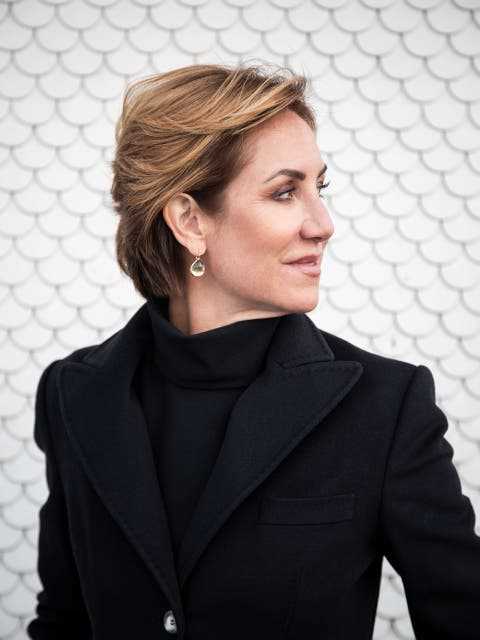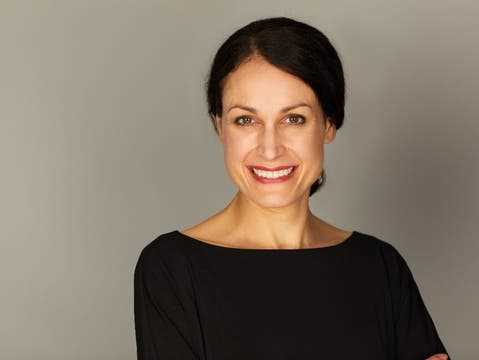The challenges remain great, but the NZZ manages to finance its core business from its own resources and grow again. Federal Councilor Karin Keller-Sutter congratulated her at the General Assembly and reflected on freedom, security and tolerance.
The mode of mediation has changed, but the purpose remains the same: a newspaper seller on May 8, 1945 at the main train station in Zurich.
After a two-year break due to Corona, more than 600 shareholders of the AG for the Neue Zürcher Zeitung met on Saturday in Zurich’s Kongresshaus for their 154th General Assembly (AGM). They had reason to be happy. Not only because of the renewed social exchange and the traditional lunch with honorable guests, which this time included Federal Councilor Karin Keller-Sutter. Also because of the good course of business and because the pandemic and now the war in Ukraine have really shown the value of independent information and a liberal voice that relies on high-quality journalism.
A fifth more readers
The sudden restrictions on freedom in the pandemic have made some people more aware of the value of critical questioning. Russia’s attack on Ukraine is a brutal reminder that there is no end to history and that Switzerland cannot simply escape international conflicts and upheavals either. On-site explanations and classifications offer added value, for which more customers are fortunately willing to pay the NZZ more.
This has allowed the NZZ to increase the number of its subscribers by a good fifth over the past two years. Also thanks to price increases, particularly in the digital offerings, for the first time in a long time it was possible to increase total sales despite falling advertising revenues. Last year, at CHF 239.5 million, this was 8 percent higher than in the previous year and also 4 percent higher than in 2019 before the Corona crisis. Together with continued rigid cost management, this resulted in growth in net profit attributable to shareholders of 52.8 percent compared to the previous year and 30.5 percent compared to 2019 to CHF 22.5 million.
Behind this is a fundamental transformation of the business model. “We have managed to reverse the relationship between revenue from the advertising market and the user market,” explained CEO Felix Graf. “Twenty years ago, 70 percent of advertising revenue was opposed to 30 percent of subscription revenue. Now we still generate 30 percent of revenue from the advertising market and 70 percent from the reader market.” Although the decline was usually slightly less severe than that of the comparable competition, within two decades the advertising income at the NZZ has also fallen by a good four-fifths due to the digital transformation.
The key strategic question for Etienne Jornod, President of the Board of Directors, has been whether NZZ can run a profitable business with income from subscriptions despite the downturn in the advertising market. “The good news is yes!” Jornod announced happily at the AGM.
Growth in Germany and new offers
Jornod emphasized that the Board of Directors made a conscious decision in favor of a clear focus on journalism and against broad diversification. Journalism is not cross-subsidised, and digitization is not a threat, but an opportunity for success. It helps to increase the readership.
In order to continue to be successful in the future, the NZZ wants to use new digital offerings such as the «NZZ magazine» Open up new target groups and markets. Jornod explicitly mentioned the offer in Germany, which is already profitable and contributes to the overall success. This expansion is needed in order to be able to finance Swiss expenditure on a sustainable and long-term basis, explained the NZZ Chairman of the Board of Directors.
There are also new special offers such as «The Market»for investors and «NZZ Pro Global» for anyone with a deep interest in the global economy and geopolitics. In May, the “Sustainable Switzerland” platform will also be launched as a new format in cooperation with various partners.
However, Jornod also warned the shareholders against exaggerated expectations: One should not have any illusions. The challenges are still great, and it remains extremely difficult to achieve further growth.

Carolina Müller-Möhl.
The shareholders remained confident that this will succeed. They approved all of the Board of Directors’ proposals with well over 90 percent of the votes. CHF 10 million of the net profit will be paid out in the form of a dividend of CHF 250 per share. After 12 years, Caroline Müller-Möhl is stepping down from the administrative board, but will remain with the NZZ as a member of the journalistic committee.

Laura Meyer.
Laura Meyer (*1981) was newly elected to the Board of Directors. The Zurich native is a proven digital expert. She knows the NZZ from the inside, having switched from McKinsey to NZZ-Verlag in 2014. She then went to UBS and finally took over the management of the Hotelplan Group at the beginning of 2021.
Keller-Sutter warns of identity politics
At the traditional banquet, Federal Councilor Karin Keller-Sutter mused that not only the NZZ had to adjust to a new normality, in which only the unpredictable could be predicted with certainty. With a war in Europe, the question of security has taken on a new urgency. For Switzerland, membership in Schengen/Dublin and thus the contribution to the European agency for the border and coast guard Frontex, which will soon be voted on, is an important pillar of its security and migration policy.
Keller-Sutter warned that anyone who upholds freedom must also be prepared to protect the freedom of others, and warned against intolerant identity politics and anything morally and populistically exaggerated. Liberal politics must be able to withstand complexity and should always be aware that others can also be right.
Editor-in-Chief Eric Gujer took a similar line by espousing an attitude grounded in realistic geopolitical variants, with an increased awareness that anything is possible and everything is connected. That can mean promise, like the fall of the Berlin Wall in 1989, but it can also mean a threat, like the war in Ukraine now. Violence is a particular threat to the world order because it breaks all the rules. But the terrible simplifications are also a major security risk.
And so, for more than a century and a half, the shareholders have been asking their NZZ to counter hasty conclusions and dangerous simplifications with sober, fact-based journalism and a clear, liberal opinion. The task has remained the same, only the form of mediation has changed.
